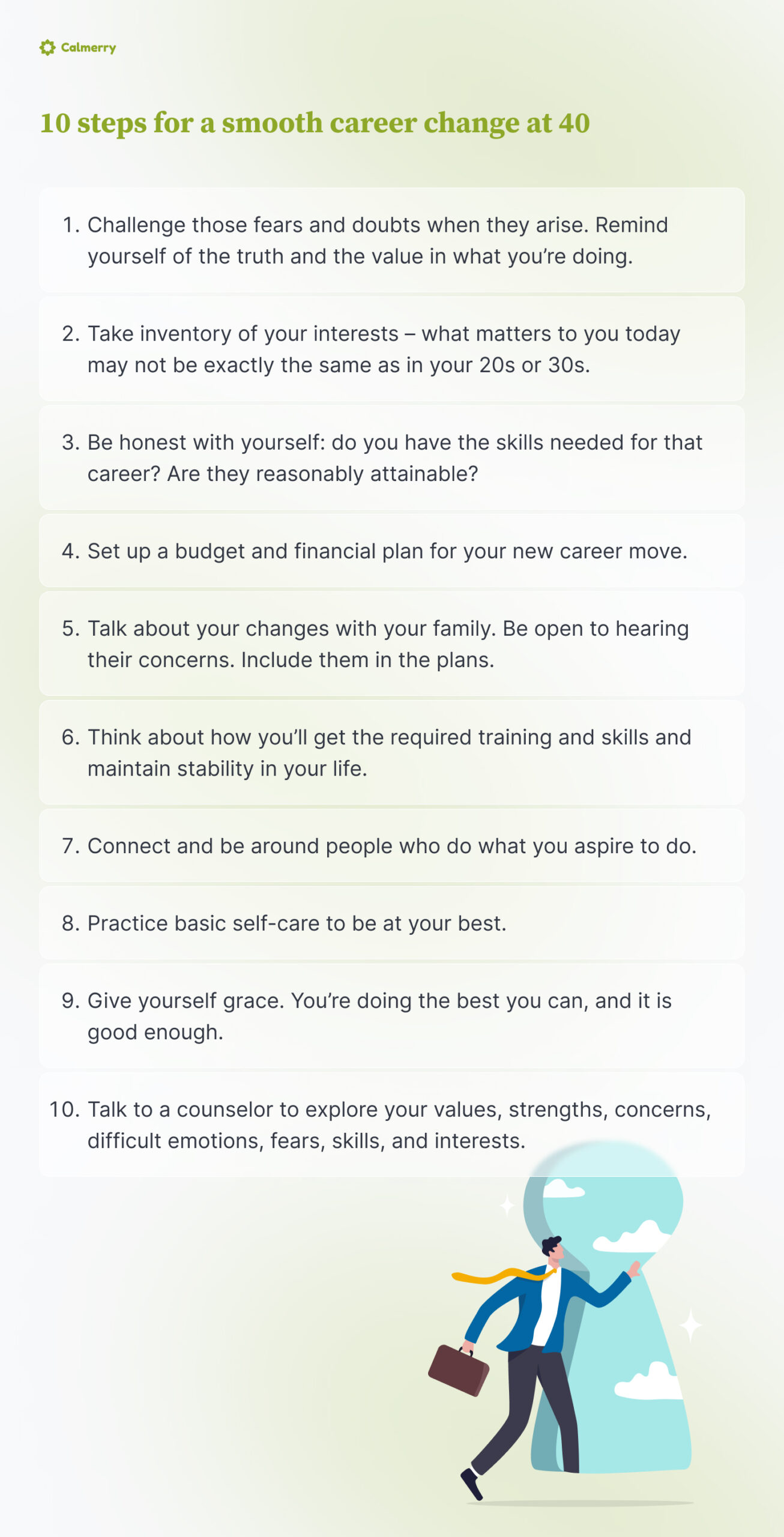Career Change at 40: Tips for Making a Successful Transition

In this article
When you started your career, you probably never dreamed you’d find yourself here – changing careers at 40. But here you are…
Finding yourself faced with such a major change at midlife can be scary, even if the change is by choice. The idea of starting again leaves you feeling overwhelmed and alone on this new journey, unsure of where to begin.
The good news is, you’re not alone. With the ever-evolving job market and new opportunities emerging, the days of one job from day one to retirement are largely a thing of the past. In fact, having one, two, or even three careers over the course of a lifetime is the new normal.
For some, changing careers at midlife is something they didn’t see coming. For many others, it’s a much anticipated and welcome change. There’s no denying that change, even welcome change, can be daunting and downright scary. Change is also a necessity in life. It’s what keeps us moving forward.
Regardless of how you’ve come to this place, starting a new career at 40 can be a time of growth that can open doors to adventures and possibilities you never imagined. It can be an opportunity to pursue dreams you thought were long since forgotten or to take a chance at something new.
But is a potentially life-changing midlife decision like changing careers doable? If you find yourself facing a midlife career change, there are things you can do to prepare and face your new beginning with confidence.
Is it just a midlife crisis?
If you’re feeling the tug towards something new, you might be wondering if this change is really “the dream” or you are just having a bit of a “midlife crisis”? It’s a reasonable question to ask.
There’s no shortage of cliché references to having a “mid-life crisis” in pop culture. It has become a popular phrase used to describe someone at midlife who starts to make drastic, sometimes abrupt life changes. Think of the stereotypical 40-something buying that hot little red convertible they’ve always wanted or suddenly quitting their job to pursue their artistic desires.
While these are cliché examples, there is some science to support a connection between mid-life and change. It’s a time characterized by the questioning of one’s choices and accomplishments and whether those pursuits are still fulfilling.
– Dr. Dawn Ferrara, PsyD, Licensed Professional Counselor (LPC), and mental health writer
Responsibilities are changing, physical abilities may be changing, and even your interests and priorities may be changing. Midlife is also a time of looking back and assessing where you’ve been and what’s important moving forward.
These shifts can leave you feeling like “I don’t know who I am” and wondering, “What’s next for me”?
It’s a normal part of the adult life cycle, but it can be stressful. For many adults, those stressors are often the catalyst for change. That change can come in many forms, including relationships, hobbies, or even a new career path.
Common stressors people tend to experience at midlife include:
- Boredom or loss of interest
- Loss of a loved one
- Divorce
- Empty nest
- Career stagnation
Of course, not everyone will experience a seismic shift at 40. In fact, only about 10-20% of adults will experience significant distress or disruption in their lives during this period. [1] Lachman, M. E. (2004). Development in midlife. Annual Review of Psychology, 55(1), 305–331. https://doi.org/10.1146/annurev.psych.55.090902.141521
For most adults, midlife is a time of reevaluation and preparing for the next season of life. The focus tends to shift more towards an increasing desire for self-fulfillment and purpose. And for many, that means a new career.
– Dr. Dawn Ferrara, PsyD, Licensed Professional Counselor (LPC), and mental health writer
Is 40 too old to start a new career?
There’s an old saying that goes something like this: you’re never too old to be who you might have been. In other words, it’s never too late to pursue your passion and purpose.
Can you start over at 40? Of course. History is full of people who started new careers and found success at midlife and beyond:
- After working for years as an editor, award-winning writer Toni Morrison published her first novel at age 40. [2] The Editors of Encyclopaedia Britannica. (2023, November 25). Toni Morrison | Biography, Books, Beloved, The Bluest Eye, & Facts. Encyclopedia Britannica. https://www.britannica.com/biography/Toni-Morrison She went on to receive a Pulitzer Prize at age 56 and a Nobel Prize in Literature at age 62.
- Ray Kroc sold milkshake machines and paper cups for years. He bought a McDonald’s in his 50s and grew it into the successful franchise it is today. [3] Ray Kroc. (2023, June 30). Biography. https://www.biography.com/business-leaders/ray-kroc
- Julia Child worked in marketing and advertising but had a passion for cooking. At age 49, she published her first cookbook, launching her career as a celebrity chef. [4] The Editors of Encyclopaedia Britannica. (2023, November 13). Julia Child | Biography, Cookbooks, Documentary, & Facts. Encyclopedia Britannica. https://www.britannica.com/biography/Julia-Child
- Stan Lee, famous for creating superheroes like Iron Man and Spider Man, found success in his 40s. Prior to that, he’d held a number of jobs, including sweeping floors and assisting other writers where he worked. [5] The Editors of Encyclopaedia Britannica. (2023, November 8). Stan Lee | Biography, Comics, Characters, Cameos, & Facts. Encyclopedia Britannica. https://www.britannica.com/biography/Stan-Lee
The list can go on and on. And then there are the folks whose names you’ll probably never know:
- The doctors, lawyers, and engineers who start training in their 40s and beyond
- The people who leave corporate life to pursue a dream job or passion
- The ones who turn their love for music, the arts, or their hobby into a new career path
- Those who embrace tech and find a new career and creative outlet
There is no “age” for starting a new career. Sometimes, it comes from the desire to follow a dream. Sometimes, it’s borne from necessity. And, sometimes, it’s just serendipity – the stars just align.
Finding a new career at 40 is something that a lot of people do successfully, and you can, too. A new career opportunity can come from almost any place you can imagine.
The question is, “Are you ready to take the step?”
Can you reinvent yourself at 40?
Starting over at 40 can seem like an impossible task. It sounds great, but you’re probably wondering whether you can really reinvent yourself at 40 or are some people just lucky?
The short answer is yes, you can! The longer answer is yes, with good planning.
The fact is, you are not who you were in your 20s or even your 30s. None of us are. We grow and mature. Wants and needs change. Plans change as life unfolds. Sometimes, careers we thought we wanted to turn out to be not quite what we expected. Maybe it’s no longer a good fit or it’s simply run its course.
Whatever the reason, here you are, pondering what comes next.
It’s easy to see yourself in a new career, doing what you love. But then, reality steps up, and the very idea of starting a new career at 40 years old gets scary. By this time, you have lived a lot of life already and have probably taken on a few responsibilities.
You may have a partner you’re doing life with, kids still at home or a mortgage and car payments, or college tuition. You could just say, let’s do it and see what happens! But you have to remember that the choices you make impact the life you’ve built and those you love, too.
What you need is a plan. A well-thought-out plan helps you move from one phase to the next without sending your world and those you love reeling. A plan allows you to transition from where you are to where you want to be in a way that helps you maintain stability in your life and helps to keep you on track.
– Dr. Dawn Ferrara, PsyD, Licensed Professional Counselor (LPC), and mental health writer
Making a plan also reinforces your commitment to the process and even motivating as you see the pieces coming together.
And yes, even if your career change is one you didn’t see coming (e.g., a layoff), you can still make a plan for what comes next and take care of yourself and those you love.

Making a smooth transition with 10 steps
Most people don’t just wake up one day and say, “I think I will quit my job today and build luxury sandcastles from now on.”
People who successfully make the transition to a new career take time to plan and put the supports in place they’ll need.
So, where do you start? A good rule of thumb is to start where you are.
Mindset matters
When we are considering making a big change, it’s tempting to talk ourselves out of it and stay right where we are. It’s comfortable. But nothing grows in the comfort zone.
Your mind can be your best ally or your worst critic. It can talk you out of doing the very thing your heart wants most. As you’re considering your new career, take time to cultivate a positive mindset.
– Dr. Dawn Ferrara, PsyD, Licensed Professional Counselor (LPC), and mental health writer
Challenge those fears and doubts when they arise. Remind yourself of the truth and the value in what you’re doing.
Take inventory
Just what do you want to do? What matters to you and interests you today may not be exactly the same as in your 20s or even your 30s. What influenced your first career may not be relevant today.
- Are you considering a drastic change or just a change of scenery?
- What do you want and need from a second career? And, just as important, what do you not want (the deal-breakers)?
- What careers are on your shortlist?
- What skills or interests do you bring to the table? Are there things you would need to learn?
- What do you need to get this new career off the ground?
Let yourself ponder the possibilities and ask yourself the hard questions.
Be realistic
When considering a new career, you need to be honest with yourself: do you have the skills needed for that career? Are they reasonably attainable?
The fact is you can learn virtually any skill. The question is, how realistic is that endeavor for you?
For example, maybe being a doctor was the dream job. At 40, going to medical school, while absolutely doable, requires a high level of commitment and stamina to complete the years of school and training.
Does that realistically fit where you are today? If not, would a different career in the medical field be a better fit? Maybe. It’s all about considering where you are now and what fits.
Secure your finances
Sometimes, embarking on a new career means some financial stress as you transition from one career to the other. How will you navigate the financial shift?
There may be a gap between paychecks. You may have to spend some money to learn new skills or even go back to school. You may have startup expenses.
Setting up a budget and financial plan for your new career move can help ease some of the worry about keeping up with your financial obligations.
Have the hard conversations
If you have a partner or kids, then your career change is very much a family affair. The changes it will bring will affect your family, too. Talk about it. Be open to hearing their concerns. Include them in the plans.
When everyone knows what’s happening and feels included, it’s easier to work together. And you’ll be happy for that support when the transition gets hard.
Prepare for the change
Preparation will depend on just what your new career requires. You may need to gain new skills or specific training. You may need to go back to school. You may need to acquire licenses or training or any number of things.
Think about how you’ll do that and maintain stability in your life. Include those important people in your life when you’re making the decision on how best to acquire what you’ll need.
Get connected
Whether you’re branching out in the same industry or moving in an entirely different direction, making connections can be a game changer. You never know who may have just the right opportunity for you or connect you with someone who does.
Make it a point to be around people who do what you aspire to do and in the places where it’s done. You’ll naturally connect with others who share your interests and who may need what you bring to the work world.
Practice self-care
Self-care for a career change? It might sound odd, but self-care is the foundation of well-being. Life changes can be stressful, and you want to be at your best as you step into your new career.
Self-care doesn’t have to be complicated. Sometimes, the basics are the best:
- Mind the Big 3 – Be sure you’re eating well, getting good sleep, and getting some movement in your day.
- Make time for relaxation – Take a walk or attend a yoga class. Make time for things that help you to relax and recharge.
- Make time to connect with friends and family.
Give yourself grace
Change is rarely smooth. Expect that there will be missteps. It’s how we learn and grow. As you move into your new career, give yourself grace. You’re doing the best you can, and it is good enough.
And remember, it’s OK to ask for help if you need it.
Seek professional help
Career counseling isn’t just for those fresh out of school or new to the workforce. Career counseling, sometimes referred to as career coaching, is a specific type of counseling focused on helping you explore possible career paths and options, whether you’re brand-new to the workforce or considering a new career altogether.
Career counseling helps you explore your values, strengths, skills, and interests to help you find the career path that is right for you. You’ll also work through the emotions and stressors that can come along with major life changes like changing careers.
Get support and help on Calmerry
One of the biggest challenges when seeking help is knowing where to go and what to do. Online therapy has become a popular alternative to traditional in-office therapy and makes it easy to see a career counselor when and where it works best for you.
Sessions can be scheduled at your convenience and from the comfort of your home or other private location. And, most importantly, online therapy has proven to be as effective as in-office therapy.
Calmerry has licensed and accredited career counselors and coaches who can help you explore your options and make the decisions that are the right fit for your next career move.
When you complete a brief survey, you can be matched with a professional within one hour and start therapy in one to two days. There’s no waiting weeks or months for an appointment.
And there’s no complicated process to get started. One tap – and you’re on your way to getting the help you’re seeking. When you’re ready, we’re here.
Lachman, M. E. (2004). Development in midlife. Annual Review of Psychology, 55(1), 305–331. https://doi.org/10.1146/annurev.psych.55.090902.141521
The Editors of Encyclopaedia Britannica. (2023, November 25). Toni Morrison | Biography, Books, Beloved, The Bluest Eye, & Facts. Encyclopedia Britannica. https://www.britannica.com/biography/Toni-Morrison
Ray Kroc. (2023, June 30). Biography. https://www.biography.com/business-leaders/ray-kroc
The Editors of Encyclopaedia Britannica. (2023, November 13). Julia Child | Biography, Cookbooks, Documentary, & Facts. Encyclopedia Britannica. https://www.britannica.com/biography/Julia-Child
The Editors of Encyclopaedia Britannica. (2023, November 8). Stan Lee | Biography, Comics, Characters, Cameos, & Facts. Encyclopedia Britannica. https://www.britannica.com/biography/Stan-Lee
online therapy
live video session


